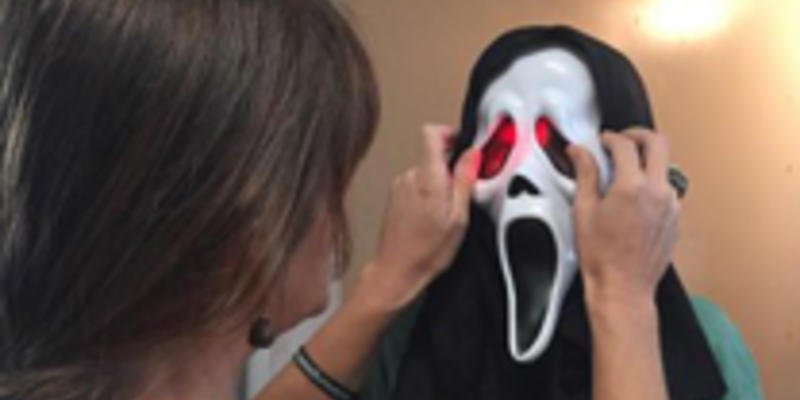
Super mom Lori Simpson manages to costume herself, four kids, her husband and dog for under $100. How does she do it? Hacking LED lights. She showed us how she does it at Makelab Charleston this past Sunday, October 19.
Cheap toys from the dollar store can be taken apart and taped to costumes to add more effect. Simpson says buying light-up toys or even taking apart an old trinket can be a lot cheaper than buying a costume that already comes with lights. She says red lights are the best ones to use in a mask because they won’t affect your vision at night.
DIY: Steps to a make a light-up Halloween costume
- Take a cheap toy apart (a screwdriver might come in handy).

- Remove the light from the toy, making sure to keep batteries and anything else the light needs to work intact.
- Duct tape the light to the desired spot on your costume, keeping comfort in mind. Simpson says you can also tape gauze around it for added comfort.

- Add as many lights as you’d like.
- Put your costume on, and enjoy!

Don’t just treat the kids—LED lights can also be added to regular clothing if you don’t want to put on a full-blown costume but still want some added flair for the holiday.
Simpson showed us how to add lights under the lapel of a denim jacket. She took apart an LED light-up wand she got from the Dollar Store and removed the light from its plastic casing.

She then taped the lights under the lapels of her jacket, making sure to secure anything that could move and stop the light from working.

She turned the lights on, and score—a blinged-out jacket for Halloween!

Simpson, who owns a family business that makes light-up hula-hoops, started taking classes at Makelab Charleston this past August. Before she was a member, all she could do was change out a car radio. Now, her husband calls her an artistic engineer.
Makelab Charleston was started over three years ago by Joe Dwyer, Chad Hobbs, David Vandermolen, and Jarick Cammarato.
Dwyer noticed there wasn’t a community hacker lab in Charleston when he moved here from Orlando, so he set out to make one.
Makelab’s classes are centered around technology. “Makelab is seeking to provide a safe environment to explore the edges of technology,” says Dwyer. “We’re really into taking the screws out, figuring out what the component parts are, and making things better.”
Makelab Charleston has a lot of toys available to people that like to "make," including a 3D printer and a CNC machine, a computer that uses coordinates to cut materials.

Joe Dwyer, one of the founders of Makelab Charleston.

The Makelab Charleston logo made with a 3D printer.
The lab hosts multiple events a week, with membership costing $30 a month.